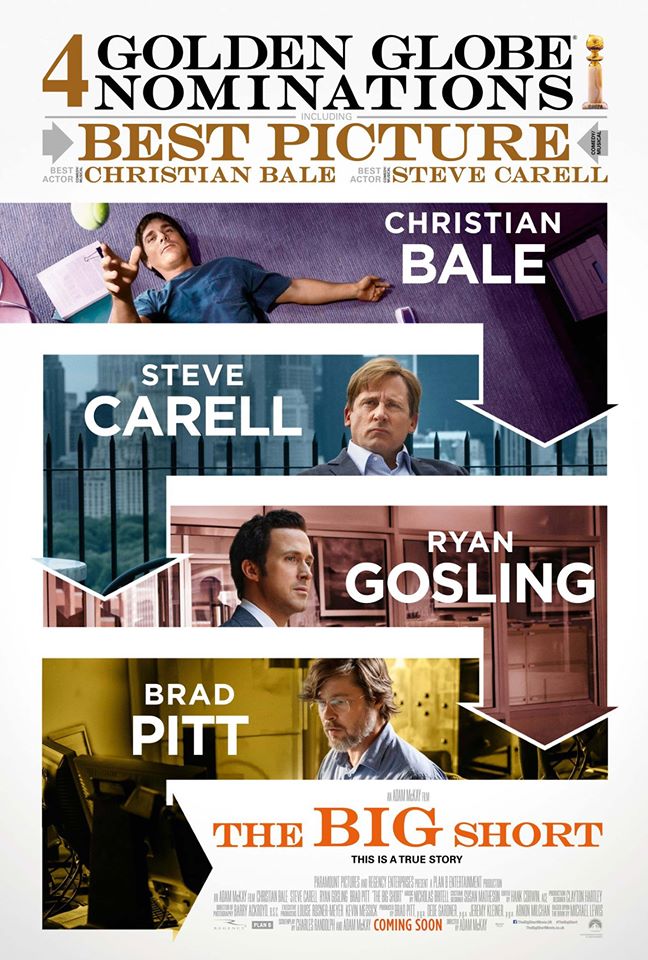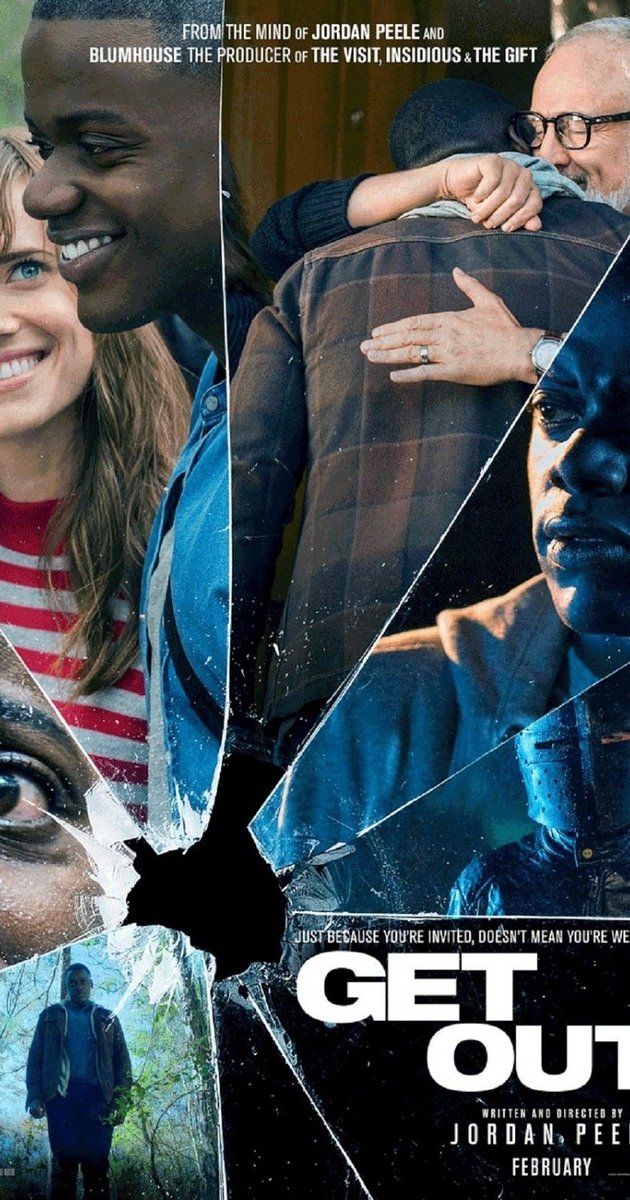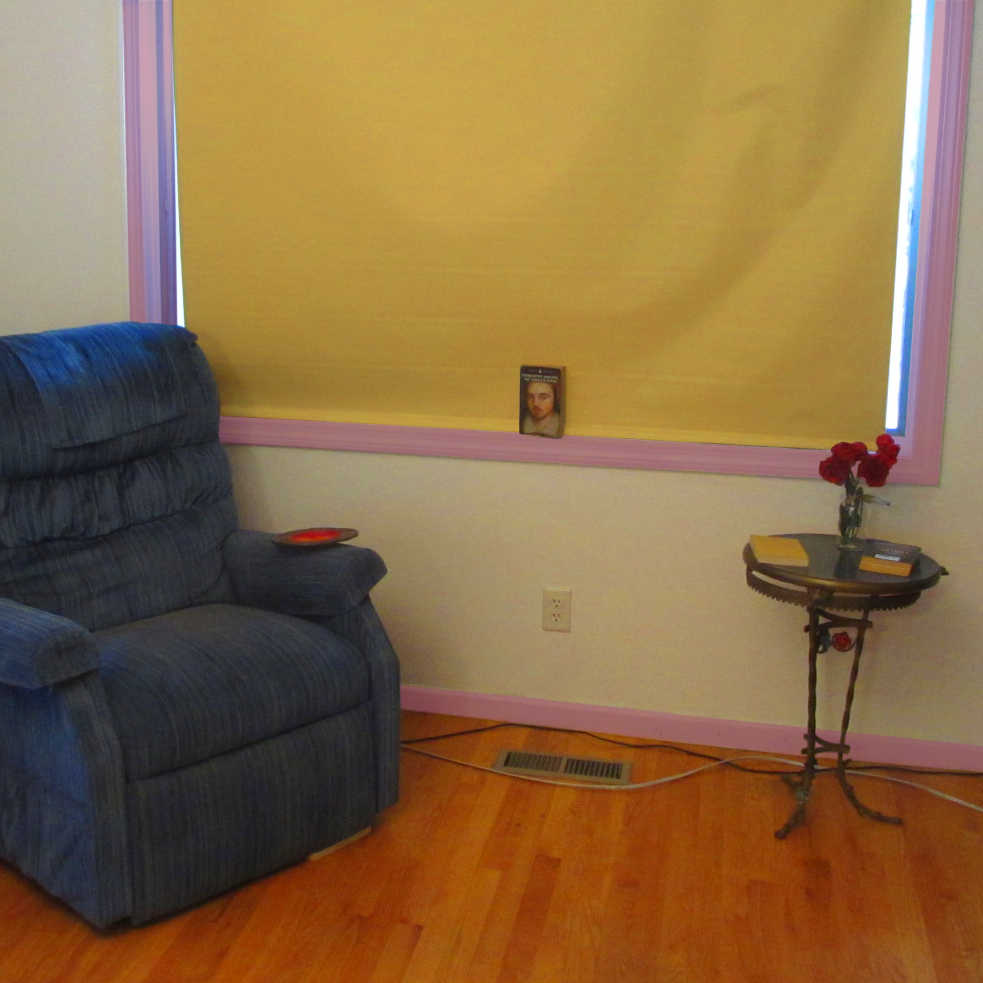We're seeking new members for our 2025 Board of Directors, as well as our founding Associate Board for young professionals 35 and under. Details and application at each of the links above.
The CHIRP Blog
Clarence Ewing: The Million Year Trip writesThe Fourth Wall: The Big Short
[Welcome to the Fourth Wall, CHIRP's weekly e-conversation on cinema. This week's subject is the Adam McKay film The Big Short. This edition is written by CHIRP Radio volunteers Kevin Fullam and Clarence Ewing.]
 Clarence: Kevin, I watched The Big Short twice. In trying to form an opinion of it, I had to look up the word “ambivalent” to make sure I was using it correctly. Turns out I was. I am deeply ambivalent about this movie, and I can’t figure out exactly why.
Clarence: Kevin, I watched The Big Short twice. In trying to form an opinion of it, I had to look up the word “ambivalent” to make sure I was using it correctly. Turns out I was. I am deeply ambivalent about this movie, and I can’t figure out exactly why.
A brief synopsis: The movie, based on the best-selling book by Michael Lewis, dramatizes events leading up to and immediately following the 2007-08 U.S. financial crisis where the housing market, once considered a bedrock of the economy, blew the F up as a result of Wall Street greed and incompetence.
Three separate groups of hedge fund managers (portrayed by a group of actors that includes Christian Bale, Steve Carrell, Brad Pitt, and Ryan Gosling) see the disaster coming and try to position themselves to make a ton of money by shorting (betting against) the value of the financial instruments they are convinced will soon be in the toilet. The story follows them as they encounter skepticism and ridicule from colleagues while discovering just how far the rot goes when it comes to high finance in the USA.
Josh Friedberg: Music Historian's Corner writesFive Sentimental Hits that I Refuse to Feel Bad for Liking
By Josh Friedberg
You know, maybe it’s just my appreciation of sincerity, but sentimentality can get an unfair rap among many critics and fans. However, sometimes, it can make for classic pop music: think of Bill Withers’s “Lean on Me,” Simon & Garfunkel’s “Bridge Over Troubled Water,” and Carole King’s “You’ve Got a Friend,” for example.
But for the overwhelming majority of pop hits that could be called cheesy or sappy, there may be a deserving stigma for excessive emotion. That said, I wanted to list five of my favorite sentimental pop hits that deserve another listen. They are ranked, leading up to the one that could feel like the guiltiest of guilty pleasures. And I will defend each pick.
5. “You Are Not Alone” by Michael Jackson
It’s easy to forget that in the last couple decades of Michael Jackson’s life, a lot of his music was panned. Despite the boring melody of this song, penned by R. Kelly, “You Are Not Alone” became the first song ever to debut at #1 on Billboard’s Hot 100 singles chart. And for at least the last two minutes, such an achievement sounds justified. Ignore the steamy video with his then-wife Lisa Marie Presley, and just focus on Jackson’s passionate vocals, backed by a stirring gospel choir. As Little Richard once said of Jackson, “Michael’s one of the few people in rock ‘n’ roll that can really sing.”
Clarence Ewing: The Million Year Trip writes@CHIRPRADIO (Week of March 20)
Special Events
- It’s the CHIRP Radio Spring Fundraiser! We want to raise $20,000 by this Friday, March 24th! We have thank-you gifts! We have a drawing for Hamilton tickets! We have an independent radio station you can help support! Make your contribution at chirpradio.org/donatenow.
New Media
- Marites Velasquez talks with Pylon Reenactment Society member Vanessa Briscoe Hay
- First Time: First Issue by songwriter, designer, and performer Ozivell Ecford
- Josh Friedberg rediscovers Alison Krauss’ Now That I’ve Found You: A Collection
- Jim Kirkhoff’s pics from the February edition of Classic Album Sunday at Saturday Audio Exhcnage
- Clarence Ewing Reviews Songs We Taught the Lord (Vol. 1 & 2) by Phil X. Milstein and Thurston Moore
- Kevin Fullam and Clarence Ewing exchange ideas about the smash movie Get Out
Clarence Ewing: The Million Year Trip writesThe Fourth Wall: Get Out and the New Old Horror
[Welcome to the Fourth Wall, CHIRP's weekly e-conversation on cinema. This week's subject is the recent smash Get Out. This edition is written by CHIRP Radio volunteers Kevin Fullam and Clarence Ewing.]

Kevin: At some point in the future, Clarence, we'll have to hold a larger discussion on the topic of horror as a whole? I'm a fan of the genre, but horror is often hamstrung by its own financial success. Studios know that there's a sizable chunk of young moviegoers (and let's be honest, they're the ones who drive box-office receipts) who will plunk down their dollars for any film inhabiting this world, and so we're often treated to lots of schlock as a result.
Get Out, however, is novel, and actually has some rather pertinent societal commentary to offer. In fact, it's a testament to the brilliant premise of the film that I walked out feeling a bit disappointed? But first, a quick, spoiler-free summary:
Clarence Ewing: The Million Year Trip writesAlbum Review: Songs We Taught the Lord (Vol. 1 & 2) by Phil X. Milstein and Thurston Moore
 On December 3 and 4, 1996, tape manipulator and sound collagist Phil Milstein got together with Sonic Youth guitarist, singer, and songwriter Thurston Moore to take a musical trip. They didn’t physically travel far to record their two duets, one at the Iron Morse Music Hall in Northampton, MA and the other at The Middle East in Cambridge, MA. But what they created might help send a listener to the inner or outer limits.
On December 3 and 4, 1996, tape manipulator and sound collagist Phil Milstein got together with Sonic Youth guitarist, singer, and songwriter Thurston Moore to take a musical trip. They didn’t physically travel far to record their two duets, one at the Iron Morse Music Hall in Northampton, MA and the other at The Middle East in Cambridge, MA. But what they created might help send a listener to the inner or outer limits.
Their recordings stand as the ultimate in “Anti-Pop” music: There are no 3-4 minute chart-friendly singles, no twenty-something starlets singing passages from their diary, no breaks featuring this month’s hot rap star. What you do have is two middle-aged dudes who recorded two very long tracks (Vol. 1 is 42 minutes long and Vol. 2 is 44 minutes) that set aside verses and hooks in favor of an approach similar to drone and noise music, something they’ve both been doing for decades.
Moore layers his guitar improvisations and effects over Milstein’s found-object sound structures as musical themes and ideas drift by like clouds. Their interactions are not unlike what jazz musicians do when they improvise, listening and responding to each other through the sounds they make.
Both volumes of this 2-record set are the kind of music where you can put your headphones on, press “play,” and lose track of time for a while. It’s good stuff if you need to add some active yet low-key abstraction to your life.